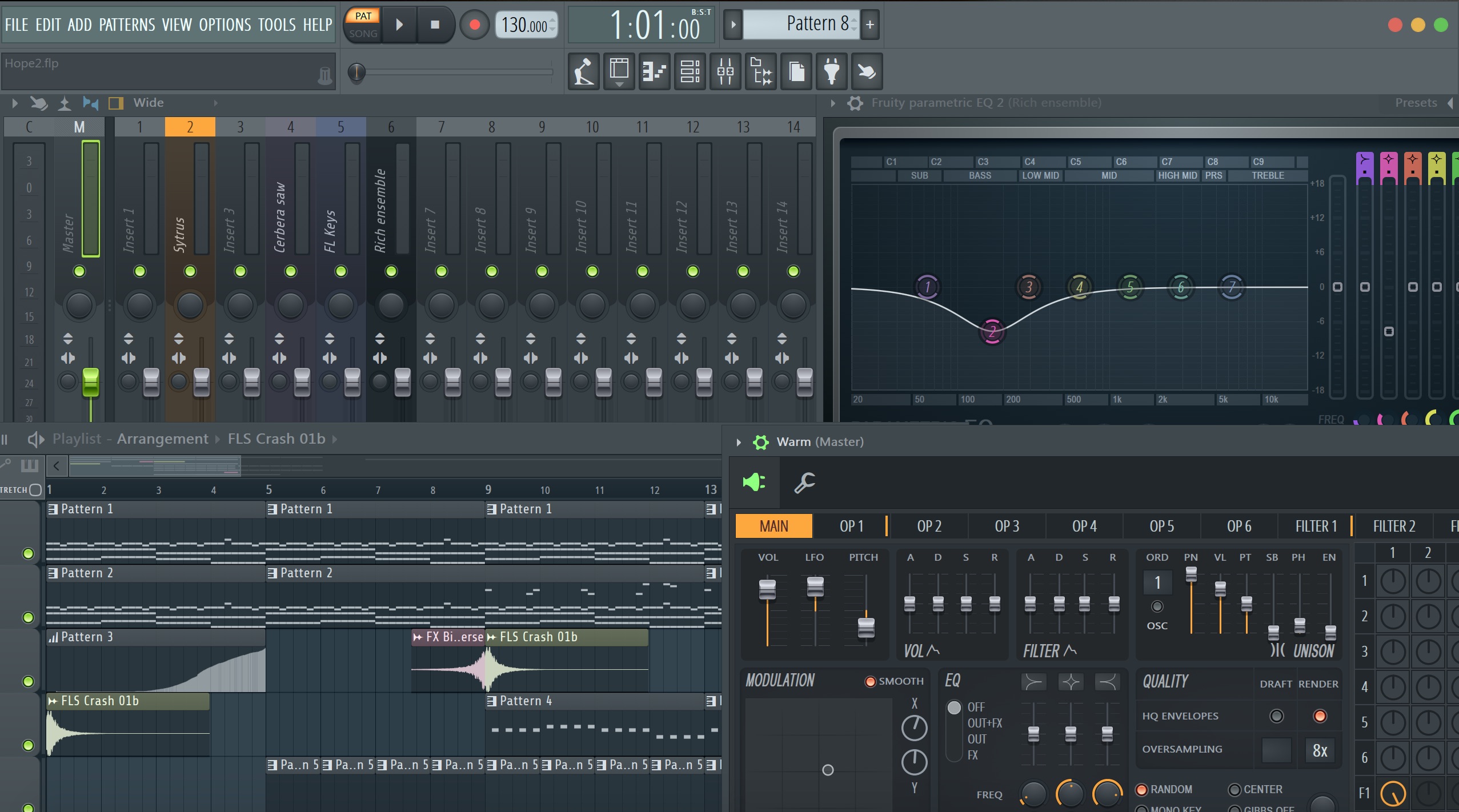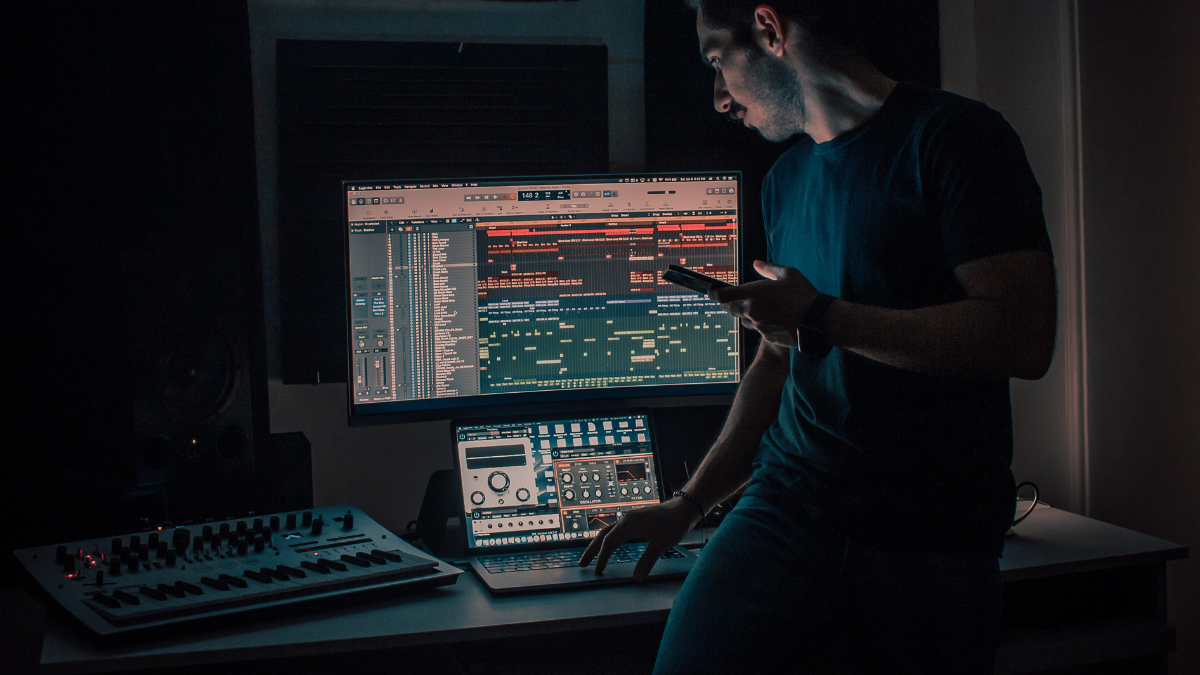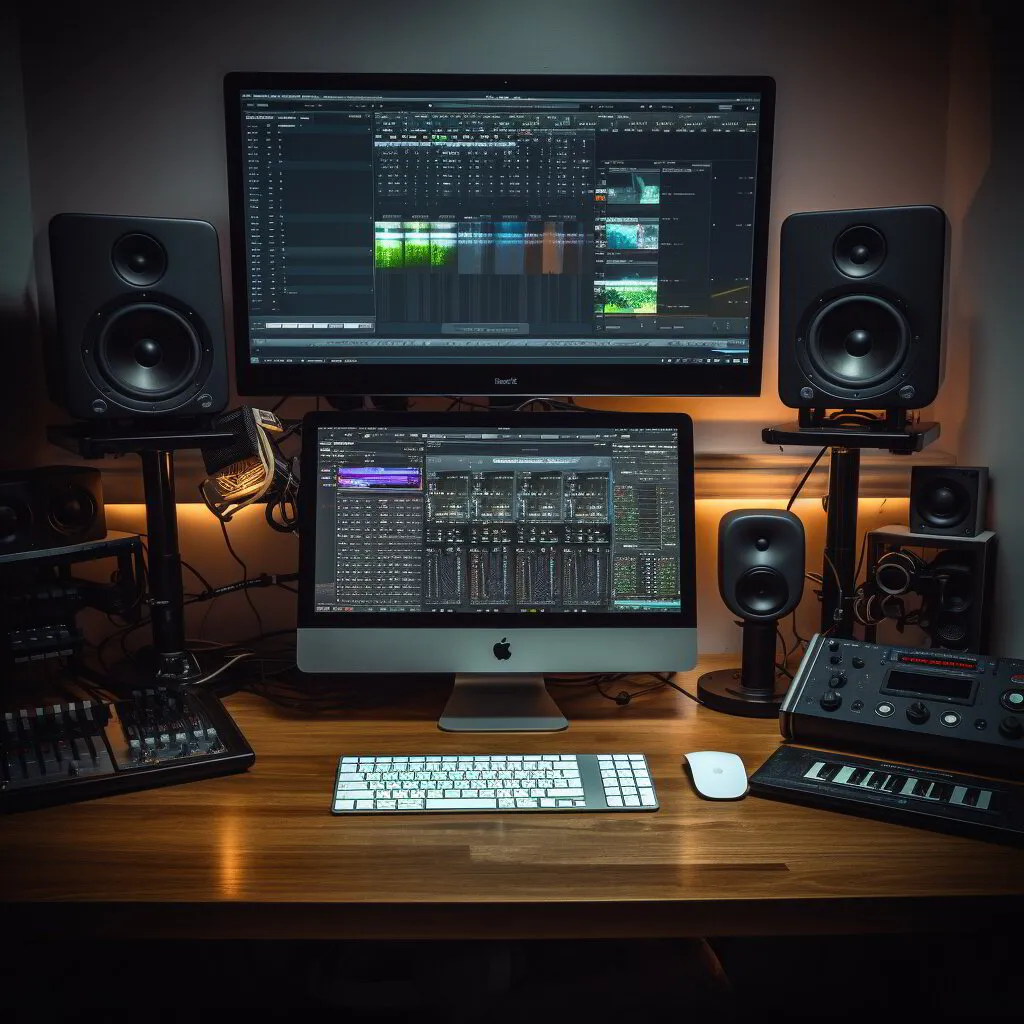Unlocking Musical Mastery: Digital Audio Workstation Tips for Music Mentorship
Finding the right guidance in the world of music production can be challenging. At theautonomics.com, we understand this, and that’s why we’ve compiled these Digital Audio Workstation Tips for Music Mentorship, designed to empower both mentors and mentees on their creative journeys. These tips provide practical advice and assistance to navigate the complexities of DAWs and foster a supportive learning environment. Whether you’re a seasoned professional sharing your expertise or a budding musician seeking to improve, these Digital Audio Workstation Tips for Music Mentorship are for you.
Explore
- 1 Essential Digital Audio Workstation Tips for Music Mentorship: Setting the Stage
- 2 Mastering the Basics: Digital Audio Workstation Tips for Music Mentorship
- 3 Advanced Techniques: Digital Audio Workstation Tips for Music Mentorship
- 4 Collaboration and Feedback: Digital Audio Workstation Tips for Music Mentorship
- 5 Beyond the DAW: Digital Audio Workstation Tips for Music Mentorship
- 6 Sustaining Momentum: Digital Audio Workstation Tips for Music Mentorship
Essential Digital Audio Workstation Tips for Music Mentorship: Setting the Stage
Before diving into the technical aspects, establishing a strong foundation for your mentorship is crucial. Effective communication and clear expectations are key components of successful Digital Audio Workstation Tips for Music Mentorship. Mentors should clearly articulate their teaching style, learning objectives, and the expected time commitment from the mentee. This upfront clarity prevents misunderstandings and fosters a productive relationship. Open communication channels are vital for addressing challenges and celebrating successes throughout the mentorship process. Regular check-ins, feedback sessions, and goal reviews ensure that both mentor and mentee remain aligned and motivated. These initial steps significantly enhance the impact of your Digital Audio Workstation Tips for Music Mentorship.
Choosing the Right DAW
The choice of Digital Audio Workstation (DAW) significantly impacts the learning curve. For beginners, simpler DAWs with intuitive interfaces are often preferred. Mentors should guide mentees in selecting a DAW that aligns with their skill level and musical goals. Consider factors such as ease of use, available features, and cost when making this crucial decision. A DAW that is too complex can overwhelm a beginner, while one that is too simplistic may limit their growth potential. This initial selection directly influences the effectiveness of your Digital Audio Workstation Tips for Music Mentorship.
Mastering the Basics: Digital Audio Workstation Tips for Music Mentorship
Once a DAW is selected, focusing on fundamental concepts is essential. Digital Audio Workstation Tips for Music Mentorship should prioritize a gradual learning approach, starting with the basics of audio recording, editing, and mixing. Mentors should break down complex processes into manageable steps, providing clear explanations and ample opportunities for practice. This step-by-step approach ensures that mentees develop a strong foundation before tackling more advanced techniques. Patience and encouragement are key during this phase, as mastering a DAW takes time and dedication. These foundational Digital Audio Workstation Tips for Music Mentorship are the building blocks of future success.
DAWs often have complex interfaces with numerous tools and functions. Mentors should guide mentees in understanding the layout and functionality of their chosen DAW. This includes familiarizing themselves with the transport controls, mixer, editor, and various plugins. Hands-on exercises and practical examples are invaluable in this context. By breaking down the interface into smaller, manageable parts, mentees can gradually build their comfort and proficiency. This is a crucial aspect of effective Digital Audio Workstation Tips for Music Mentorship.
Understanding Audio Editing Techniques

Audio editing is a fundamental skill for music production. Digital Audio Workstation Tips for Music Mentorship should cover essential editing techniques, such as cutting, pasting, trimming, and fading. Mentors should demonstrate these techniques using real-world examples and encourage mentees to practice them extensively. They should also explain the importance of accurate editing for achieving a polished and professional sound. The quality of audio editing directly reflects the overall quality of the final product, making this a vital component of your Digital Audio Workstation Tips for Music Mentorship.
Advanced Techniques: Digital Audio Workstation Tips for Music Mentorship
As mentees progress, introducing more advanced techniques becomes essential. Digital Audio Workstation Tips for Music Mentorship at this stage should focus on areas such as mixing, mastering, and sound design. Mentors should explain the theoretical concepts behind these techniques and provide practical guidance on how to apply them in the DAW. They should also encourage experimentation and exploration, allowing mentees to develop their unique creative voices. This phase requires a balance between structured instruction and creative freedom, ensuring that mentees develop both technical proficiency and artistic expression. These advanced Digital Audio Workstation Tips for Music Mentorship help unlock a higher level of musical potential.
Mixing and Mastering Essentials
Mixing and mastering are crucial steps in music production. Digital Audio Workstation Tips for Music Mentorship in this area should cover concepts such as equalization, compression, reverb, and delay. Mentors should explain how these tools can be used to shape the sound of individual tracks and create a cohesive mix. They should also guide mentees in understanding the principles of dynamic range and loudness. This knowledge is critical for achieving a balanced and professional-sounding final product. These mixing and mastering Digital Audio Workstation Tips for Music Mentorship are essential for creating commercially viable music.

Sound Design and Synthesis
Sound design plays a vital role in modern music production. Digital Audio Workstation Tips for Music Mentorship should introduce mentees to the world of synthesizers, samplers, and effects processing. Mentors should encourage experimentation and exploration, allowing mentees to discover their own unique sound palettes. They should also explain the importance of understanding the underlying principles of sound synthesis and signal processing. This knowledge empowers mentees to create innovative and expressive soundscapes. These sound design Digital Audio Workstation Tips for Music Mentorship allow for limitless creative possibilities.
Collaboration and Feedback: Digital Audio Workstation Tips for Music Mentorship
Effective mentorship involves more than just technical instruction. Digital Audio Workstation Tips for Music Mentorship should also emphasize the importance of collaboration and constructive feedback. Mentors should create a safe and supportive environment where mentees feel comfortable sharing their work and receiving feedback. They should provide specific and actionable suggestions for improvement, focusing on both technical aspects and artistic expression. Regular feedback sessions are crucial for tracking progress and identifying areas that need further attention. This collaborative approach significantly enhances the learning experience and fosters a sense of community among mentees. These collaborative Digital Audio Workstation Tips for Music Mentorship are vital for growth and development.
Constructive Criticism Techniques

Giving and receiving constructive criticism is a vital skill for musicians. Digital Audio Workstation Tips for Music Mentorship should equip both mentors and mentees with the tools to provide and receive feedback effectively. Mentors should learn to offer specific, actionable suggestions rather than general pronouncements. Mentees should learn to approach criticism with an open mind and use it to improve their work. This fosters a growth mindset and encourages continuous improvement. This is an essential aspect of successful Digital Audio Workstation Tips for Music Mentorship.
Sharing and Receiving Feedback Effectively
Effective communication is paramount in a mentorship relationship. Digital Audio Workstation Tips for Music Mentorship should emphasize clear communication, active listening, and respectful dialogue. Mentors should provide a supportive environment where mentees feel comfortable expressing their ideas and concerns. Mentees should actively listen to feedback and ask clarifying questions. This promotes mutual understanding and ensures that both parties are on the same page. Clear communication is a crucial element of successful Digital Audio Workstation Tips for Music Mentorship.
Beyond the DAW: Digital Audio Workstation Tips for Music Mentorship
While mastering a DAW is essential, music production extends beyond the software. Digital Audio Workstation Tips for Music Mentorship should also address broader aspects of music creation, such as music theory, songwriting, and performance. Mentors should encourage mentees to explore these areas, recognizing that a well-rounded musical education enhances their overall creative capabilities. Encouraging mentees to attend workshops, concerts, and other musical events further broadens their horizons. These broader Digital Audio Workstation Tips for Music Mentorship complete the artist’s development.
Exploring Music Theory and Songwriting
Understanding music theory and songwriting principles enhances a musician’s creative process. Digital Audio Workstation Tips for Music Mentorship should incorporate these fundamental elements, guiding mentees in understanding melody, harmony, rhythm, and form. Mentors can introduce concepts such as chord progressions, scales, and song structures, helping mentees create more compelling and effective compositions. This theoretical foundation complements their DAW skills, resulting in more sophisticated and nuanced musical creations. This is a key element in comprehensive Digital Audio Workstation Tips for Music Mentorship.
The Importance of Musical Performance
Musical performance skills are integral to a complete musical education. Digital Audio Workstation Tips for Music Mentorship should encourage mentees to develop their performance skills, whether through live performances or studio recordings. Mentors can guide mentees in techniques such as stage presence, microphone technique, and vocal performance. They can also provide feedback on performance recordings, helping mentees refine their skills and express their musicality effectively. This aspect of Digital Audio Workstation Tips for Music Mentorship cultivates well-rounded musicians.
Sustaining Momentum: Digital Audio Workstation Tips for Music Mentorship
Maintaining momentum is crucial for long-term success in music production. Digital Audio Workstation Tips for Music Mentorship should provide strategies for staying motivated and engaged in the learning process. Mentors should encourage consistent practice, regular project work, and goal setting. They should also foster a sense of community among mentees, encouraging collaboration and peer support. This sustained effort helps mentees build confidence, develop their skills, and achieve their musical goals. These long-term Digital Audio Workstation Tips for Music Mentorship are crucial for lasting success.
Setting Realistic Goals and Expectations
Setting realistic goals and expectations is vital for maintaining motivation. Digital Audio Workstation Tips for Music Mentorship should guide mentees in establishing achievable milestones and celebrating their progress along the way. This approach prevents discouragement and promotes a sense of accomplishment. Mentors should provide encouragement and support, helping mentees stay focused on their objectives. This is an important aspect of sustainable Digital Audio Workstation Tips for Music Mentorship.
Building a Supportive Learning Community
A supportive learning community can significantly enhance the learning experience. Digital Audio Workstation Tips for Music Mentorship should encourage collaboration and peer support among mentees. Mentors can facilitate this by organizing group projects, workshops, or online forums. This shared experience creates a sense of community and provides opportunities for learning from one another. This communal aspect of Digital Audio Workstation Tips for Music Mentorship creates a positive and encouraging atmosphere.
In conclusion, effective Digital Audio Workstation Tips for Music Mentorship require a multifaceted approach that encompasses technical instruction, creative guidance, and collaborative learning. By focusing on a strong foundation, gradual skill development, and a supportive learning environment, mentors can empower mentees to unlock their musical potential and embark on fulfilling creative journeys. Remember, the journey of musical mastery is a continuous process of learning, growth, and self-discovery. Embrace the challenges, celebrate the successes, and enjoy the creative process.
